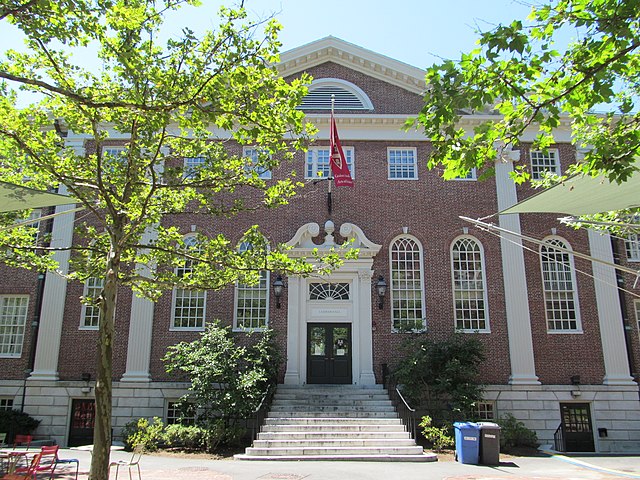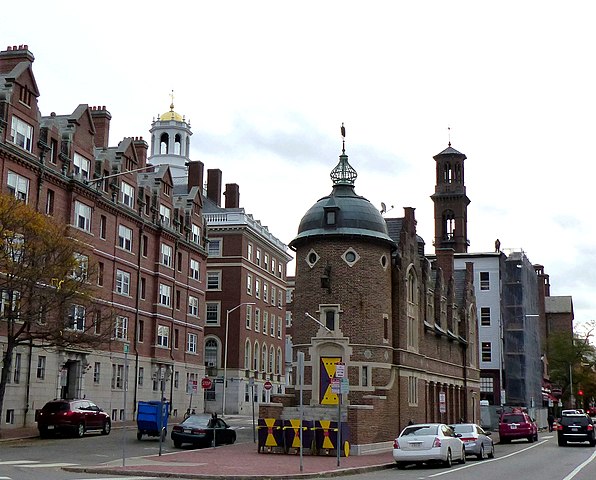
As Thammasat University students grow accustomed to online learning and distance education, some may wish to explore overseas opportunities after they have done their required coursework. Taking an extra class may be informative and help complement main areas of study, giving students new ideas and perspectives and help them to practice their English language usage.
One opportunity to consider may be free massive open online courses (MOOCs) at Harvard University, The United States of America.
Some of the academic exchanges between Thammasat University and Harvard University were reported by The Bangkok Post last year:
Thammasat University has teamed up with Harvard University and three Thai private partners in a project to develop a model smart city just north of Bangkok in Pathum Thani.
The Thai university yesterday signed a memorandum of understanding with Navanakorn Plc, RATCH Group Plc and ALT Telecom Plc for a joint study on turning Thammasat’s Rangsit campus, the Navanakorn Industrial Zone and surrounding areas into the “Thammasat-Navanakorn Smart City”…
Thammasat also signed a letter of intent with Harvard’s Graduate School of Design to create a so-called “Option Studio” for international graduate students studying architecture, landscape architecture and urban planning. The programme will be part of the smart city development.
In 2018, Thammasat Business School (TBS) students took part in Harvard Business School’s (HBS) Field Global Initiative.
Before presenting their final ideas to corporate partners, HBS students share their ideas with TBS students to refine them in future.
In 2020, the TU Office of International Affairs organized a special talk on Visiting Scholars Fellowship at Harvard to publicize opportunities to apply for visiting fellowship and doctoral scholarships in the fields of Humanities and Social Sciences, focusing on Asia, at Harvard-Yenching Institute, Harvard University.
And among the research databases offered by the TU Library is Harvard Business Publishing, the leading provider of teaching materials for management education. HBP-Higher Education offerings include case Method Teaching for professors and graduate students of Faculty of Commerce and Accountancy. It is available for graduate students and professors of the Faculty of Commerce and Accountancy. Kindly request materials from the librarian by online form at the Professor Sangvian Indaravichai Library, Tha Prachan campus.
In addition, the TU Library owns many books published by Harvard University Press, a noted academic publisher.

Among MOOCs at Harvard of potential interest to TU students is Buddhism Through Its Scriptures:
Learn about the rich and diverse beliefs and practices of Buddhists across time and place. Experience Buddhism through its scriptures, both relationally as well as academically.
What you’ll learn
- Religious/philosophical insights conveyed in Buddhist texts
- How scriptures are interpreted to diverse ends in different historical contexts
- Sensitive appreciation of world religions
Course description
Whether you are new to the study of Buddhism or have been studying it or practicing it for years, this course will provide you with the opportunity to become acquainted with a variety of Buddhist teachings while guiding you to think about them, and yourself, in new ways.
Through a combination of carefully selected readings, both scriptural and informational, as well as exposure to various forms of Buddhist practice such as art, devotional acts, and literary works, you will learn how to interpret, reflect upon, and apply the teachings of the Buddha to your own life and deepen your understanding of Buddhism.
The class instructors will be Professor Charles Hallisey, Senior Lecturer on Buddhist Literatures at Harvard University and Ms. Alexis Bader, a doctoral student in Buddhist Studies in the Committee on the Study of Religion at Harvard University.
An expert on Theravada Buddhism in Sri Lanka and Southeast Asia, Pali language and literature, Buddhist ethics, and literature in Buddhist culture, Professor Hallisey is author of a number of books which are available to TU students through the TU Library Interlibrary Loan (ILL) service.
Another MOOC of possible usefulness for TU students would be The Einstein Revolution:
Traces Albert Einstein’s engagement with relativity, quantum mechanics, Nazism, nuclear weapons, philosophy, the arts, and technology.
What you’ll learn
- Through the life and work of Albert Einstein, the changing role of physics in the 20th and 21st centuries.
- Einstein’s engagement with relativity, quantum mechanics, Nazism, nuclear weapons, philosophy, the arts, and technology
- How to engage with questions about what it means to understand physics in its broader history.
Course description
Albert Einstein has become the icon of modern science. Following his scientific, cultural, philosophical, and political trajectory, this course aims to track the changing role of physics in the 20th and 21st centuries. This history course addresses Einstein’s engagement with relativity, quantum mechanics, Nazism, nuclear weapons, philosophy, the arts, and technology, and raises basic questions about what it means to understand physics in its broader history. Participants in the course will follow seventeen lessons, each of which will present a mix of science (no prerequisites!) and the broader, relevant cultural surround. Some weeks will examine the physics concepts, while others will see excerpts of films or discuss modernist poetry that took off from relativity. Or we might be looking at the philosophical roots and philosophical consequences of Einstein’s works. At other times we will be fully engaged with historical and political questions: the building, dropping, and proliferation of nuclear weapons, for example. Typically, in a lesson (about an hour of streamed material), there will be opportunities for individual mini-essay writing, some multiple choice questions to bolster your understanding of the science, and a group activity which might one week be a debate and another a collective commentary on elements of an artwork from 1920s Weimar Germany.
Class Instructors will be Professor Peter Galison, Professor in History of Science and Physics at Harvard University and Mr. Ion Mihailescu, a Postdoctoral Fellow in the History of Physics at Harvard University.
The TU Library owns books coauthored by Professor Galison, in addition to a range of books by and about Albert Einstein.
In addition, another Harvard MOOC that may appeal to TU students is PredictionX: Omens, Oracles & Prophecies:
An overview of divination systems, ranging from ancient Chinese bone burning to modern astrology.
What you’ll learn
- A variety of methods from across cultures and history for divining the future
- A common framework that describes human attempts to predict the future
Course description
Humans have always sought to know their own future, be it the destiny of an empire or an individual’s fate. Across cultures and history, we find people trying to find their place in the Universe by attempting to gaze into the future.
Join us for this one-week, immersive learning experience as we explore “pre-scientific” prediction systems ranging from ancient Chinese bone burning to the Oracle of Delphi to modern astrology and tarot, with practitioners and Harvard faculty leading the journey. We will examine the details of over a dozen prediction systems as well as theoretical frameworks connecting them.
This module is a part of PredictionX, which examines our efforts to predict the future over all of recorded history. PredictionX courses will cover topics from omens and oracles in ancient civilizations, which this course discusses, to the evolution of the general approach to science most take today as well as modern computer simulations and the role they play in predicting our futures today.
The class instructor will be Professor Alyssa Goodman, Professor of Applied Astronomy and Founding Director of the Initiative in Innovative Computing program at Harvard University.

(All images courtesy of Wikimedia Commons)
